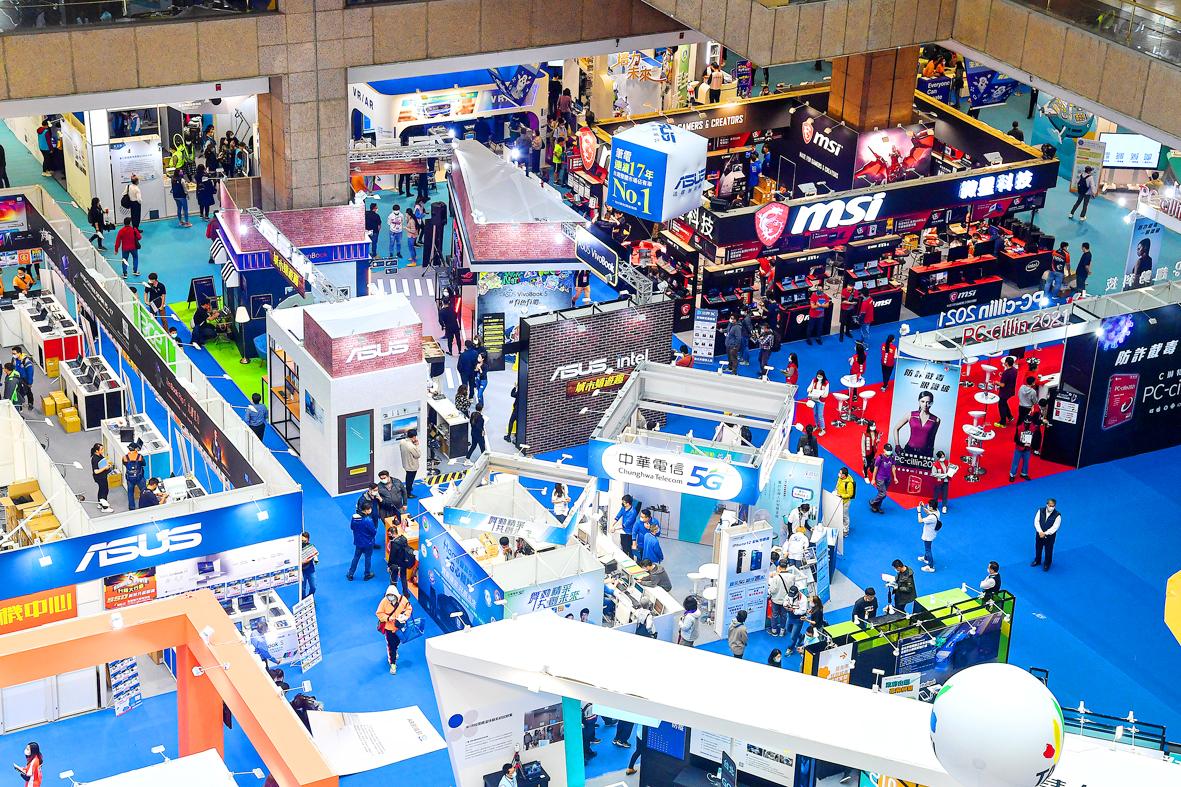Taiwan’s technology sector, in particular the semiconductor industry, is expected to remain a key driver of its economic growth next year, DBS Bank Ltd said in a report last week.
However, tech companies would still be pressured to shift sensitive production out of China and further diversify their supply chains as the US-China technology dispute takes root, the bank said.
Strong technology exports boosted the nation’s GDP, which expanded by a better-than-expected 3.92 percent year-on-year last quarter, the most since the second quarter of 2015. That prompted the Directorate-General of Budget, Accounting and Statistics (DGBAS) on Nov. 27 to adjust upward its full-year growth forecast to 2.54 percent from 1.56 percent.

Photo: CNA
The DGBAS predicted exports might remain strong this quarter and grow 7.75 percent year-on-year on the back of strong demand for new technology applications, but DBS said that global demand for computers and consumer electronics is expected to decline next year, as “the one-off purchases related to remote work and distance learning” driven by the COVID-19 pandemic dissipate.
However, demand for cloud services, data centers and 5G applications would likely continue to increase next year, as many countries build digital infrastructure and push digital transformation after the pandemic, DBS said.
In addition, smartphone demand is poised to recover next year as global income conditions improve and more consumers upgrade their smartphones as 5G networks expand, it said.
“Overall, the outlook for semiconductor demand remains constructive,” DBS economist Ma Tieying (馬鐵英) said in the report.
Taiwan has managed to maintain positive GDP growth this year despite the pandemic, which DBS forecast would expand 1.8 percent this year and 4.2 percent next year, citing the government’s early and effective response to the outbreak, as well as the tech sector’s strong performance.
Given the mild inflation outlook and the strong New Taiwan dollar, the central bank is expected to hold its policy interest rate steady at 1.125 percent through next year, as pressure to normalize rates would remain low in the near term, DBS said.
However, the potential impact of the US’ transition in leadership is worth watching, and there could be some tactical adjustments in US-China trade issues as multilateralism regains US support under US president-elect Joe Biden’s administration, the bank said.
Even though US-China trade tensions might improve under Biden’s presidency, the two countries’ tech sector rivalry would continue next year, DBS said, citing bipartisan concerns in the US about national security risks resulting from China’s advances in 5G, artificial intelligence and other new technologies.
Moreover, the COVID-19 has also caused companies to weigh the risks of geopolitical tensions among countries and diversify their supply chains, with some firms shifting their manufacturing base out of China to other Asian countries such as India, Vietnam and Thailand.
“To Taiwan, the trade disruption risk as a result of [the] China-US trade war may decrease in 2021. But pressure would remain for the Taiwanese tech companies to diversify their supply chains to hedge the risk of China-US tech tensions,” Ma said.
“In addition, [the] leadership transition in the US creates some uncertainties for the outlook of a bilateral free-trade agreement (FTA) between Taiwan and the US. The focus of Taiwan’s FTA talks may shift towards multilateral agreements like the CPTPP [Comprehensive and Progressive Agreement for Trans-Pacific Partnership] going forward,” she added.

Vincent Wei led fellow Singaporean farmers around an empty Malaysian plot, laying out plans for a greenhouse and rows of leafy vegetables. What he pitched was not just space for crops, but a lifeline for growers struggling to make ends meet in a city-state with high prices and little vacant land. The future agriculture hub is part of a joint special economic zone launched last year by the two neighbors, expected to cost US$123 million and produce 10,000 tonnes of fresh produce annually. It is attracting Singaporean farmers with promises of cheaper land, labor and energy just over the border.

US actor Matthew McConaughey has filed recordings of his image and voice with US patent authorities to protect them from unauthorized usage by artificial intelligence (AI) platforms, a representative said earlier this week. Several video clips and audio recordings were registered by the commercial arm of the Just Keep Livin’ Foundation, a non-profit created by the Oscar-winning actor and his wife, Camila, according to the US Patent and Trademark Office database. Many artists are increasingly concerned about the uncontrolled use of their image via generative AI since the rollout of ChatGPT and other AI-powered tools. Several US states have adopted

A proposed billionaires’ tax in California has ignited a political uproar in Silicon Valley, with tech titans threatening to leave the state while California Governor Gavin Newsom of the Democratic Party maneuvers to defeat a levy that he fears would lead to an exodus of wealth. A technology mecca, California has more billionaires than any other US state — a few hundred, by some estimates. About half its personal income tax revenue, a financial backbone in the nearly US$350 billion budget, comes from the top 1 percent of earners. A large healthcare union is attempting to place a proposal before

KEEPING UP: The acquisition of a cleanroom in Taiwan would enable Micron to increase production in a market where demand continues to outpace supply, a Micron official said Micron Technology Inc has signed a letter of intent to buy a fabrication site in Taiwan from Powerchip Semiconductor Manufacturing Corp (力積電) for US$1.8 billion to expand its production of memory chips. Micron would take control of the P5 site in Miaoli County’s Tongluo Township (銅鑼) and plans to ramp up DRAM production in phases after the transaction closes in the second quarter, the company said in a statement on Saturday. The acquisition includes an existing 12 inch fab cleanroom of 27,871m2 and would further position Micron to address growing global demand for memory solutions, the company said. Micron expects the transaction to